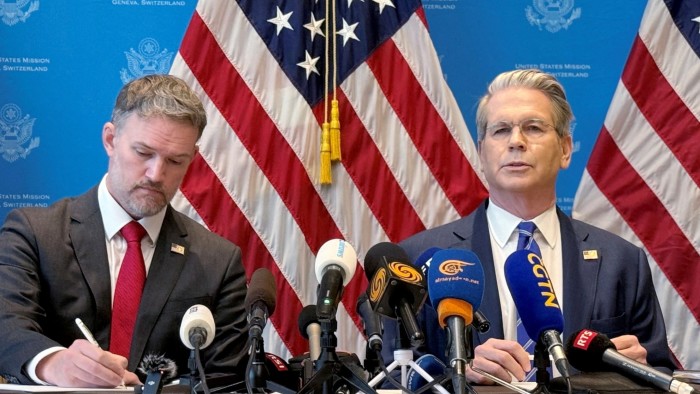This is an on-site version of the White House Watch newsletter. You can read the previous edition here. Sign up for free here to get it on Tuesdays and Thursdays. Email us at whitehousewatch@ft.com
Good morning and welcome to White House Watch! Donald Trump is in the Middle East for his first foreign tour as he seeks bromance and multibillion-dollar deals with the leaders of Saudi Arabia, Qatar and the United Arab Emirates. For now, let’s dive into:
The world’s two largest economies have agreed to a trade ceasefire — but who blinked first?
It all started with a secret meeting three weeks ago in the basement of the IMF headquarters during the group’s spring meeting. US Treasury secretary Scott Bessent met China’s finance minister Lan Fo’an to talk about their countries’ collapse in trade relations, people familiar with the matter told the FT’s Demetri Sevastopulo.
The encounter led to a weekend of talks in Geneva, where Bessent and Chinese vice-premier He Lifeng each agreed to slash their nations’ respective tariffs on the other by 115 percentage points for 90 days.
Trump took a victory lap yesterday, saying he had masterminded a “total reset” with China. Meanwhile, Hu Xijin, ex-editor of the Global Times, a national Communist party tabloid, wrote on social media that the agreement was “a great victory for China”.
Washington and Beijing had both said they were prepared for a protracted fight, but the temporary deal came about more quickly and easily than expected, suggesting both sides were enduring more economic pain than they’d said.
Economists have said that the US may have overplayed its hand.
“The US blinked first,” said Alicia García Herrero, chief Asia-Pacific economist at French investment bank Natixis. “It thought it could raise tariffs almost infinitely without being hurt, but that hasn’t been proven right.”
There was the spectre of higher inflation and empty store shelves, while Trump needed to calm nervous markets (they rejoiced yesterday as stocks soared and Treasury yields rose).
In China, jobs were at risk. And Beijing’s negotiators still have their work cut out for them to even things up. The deal brings total effective tariffs on Chinese goods to about 40 per cent, while Chinese levies on the US would be about 25 per cent, according to calculations by Capital Economics.
And any kind of permanent deal will be hard-fought.
“The US-China trade negotiations are going to be like a rollercoaster,” said Scott Kennedy, a China expert at think-tank CSIS. “Markets can breathe a temporary sigh of relief, but we’re nowhere near out of the woods.”
The latest headlines
What we’re hearing
Trump has started to bank to the left in certain policy areas, tearing a page from progressives’ populist playbook and taping it into his own.
The president seems to be inspired by his rival party’s efforts to lower drug prices, implement higher taxes on the very wealthy and strengthen price-gouging enforcement.
While announcing a push for lower drug prices, health secretary Robert F Kennedy Jr said “this was the fulcrum of Bernie Sanders’ runs for the presidency”, referring to the progressive Vermont senator.
Why the shift? Popularity, for one. Kneecapping Democrats ahead of the 2026 midterm elections, for another.
“I think Trump realises that these things are popular and he’s a guy that likes to be popular,” Liz Pancotti, managing director of policy and advocacy at Groundwork Collaborative, a left-leaning economic think-tank and a former Sanders aide, told the FT’s James Politi.
He’s also haunted by the 2018 midterms, when Democrats took back the House of Representatives by attacking Republicans’ tax cuts for the wealthy while trying to slash healthcare access for middle and low-income Americans.
The moves could also help Trump’s efforts to recast the Republican party as one for the working class, rather than business.
“I don’t think the centre of gravity within the Republican party has moved on whether higher taxes are good,” said Michael Strain, an economic policy analyst at the American Enterprise Institute, a right-leaning think-tank. “What has changed is the willingness of Republicans to go along with some of these policies that have been strongly associated with Democrats.”
Viewpoints
Source link









